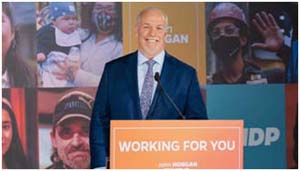
Sunday October 25, 2020 | VICTORIA, BC [Updated 11:30 pm]
by Mary P Brooke, editor | Island Social Trends
Due to the approximately half-million mail-in and absentee ballots not yet counted for the 42nd BC General Election, election-night responses from the three main party leaders (BC NDP, BC Liberal and BC Green) have been muted. | Horgan’s hunch pays off with significant majority win (55 seats BC NDP, 29 seats BC Liberal, 3 seats BC Green)
Certainly that is out of respect for the enormous number of people who put their faith in voting ‘COVID-safe’ by utilizing the mail-in ballot process (available for all past elections but used robustly in this pandemic-time election). But also there’s the intense realization that the results in possibly several of the 87 electoral districts (ridings) could be altered to a different result.
Also lingering is some of the campaign verbage, such as “doing my level best”. Although John Horgan has been saying that for years, he even noted today how he’s been saying that a lot in the last few days. It’s a connection to his late mother who — as a single parent following the death of Horgan’s father when Horgan was very young — encouraged her son-now-Premier to just “do his level best” and that would be enough or all that could be asked of him.
The voting results time-lag means that a cabinet cannot be firmly committed to yet. Officially the mail-in and absentee ballots will be manually processed and counted starting after November 5, and could take up to a week, even though some of the pre-sorting (opening delivery envelopes and separately out the secret-sleeved ballots) has already begun in some District Electoral Offices.
So that further delays the full establishment of the cabinet and new government directions (including mandate letters) and any new initiatives being brought forward quickly. Today Horgan indicated that the $1,000 per family ($500 per individual) COVID support payment that was promised by now premier-elect John Horgan during the 32-day campaign might not come in the very near term.
Long-time MLA on the west shore:
John Horgan is now in his fifth term as MLA for Langford-Juan de Fuca. As he seems not to want the job for the power of it all, it returns to him time and again. Last night he thanked his family for indulging his desire to ‘be among the people’.
Choosing his key players:
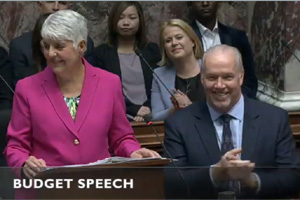
Choosing a new finance minister who can ably fill the shoes of Carole James will be Horgan’s toughest call. “I regret Carole James not sitting beside me (in the legislature),” said Horgan today in a morning-after Sunday media teleconference.
Horgan said today that he now has “an embarrassment of riches” when it comes to the range of “young faces that will bring new perspectives”, as in young incoming fresh MLAs who can serve in the upcoming BC NDP caucus and possibly cabinet.
Other than remarking on the hole in the boat that Carole James’ retirement from elected politics creates, Horgan today did not mention any other names of cabinet ministers past or future. Clearly Dix is in the running again, however, as Health Minister, given his passion and track record in that portfolio. As for Transportation, that spot is now open after Claire Trevena not seeking re-election. And the post of Minister of Mental Health and Addictions is wide open as founding minister Judy Darcy did not seek re-election (she was already comfortable last night being a political pundit on live TV election coverage).
He will draw upon the east-side-of-the-Island connections of re-elected Sheila Malcolmson and Ronna-Rae Leonard, and the mid-island connections of newly elected Josie Osborne (formerly the mayor of Tofino).
He now has an opportunity to free up David Eby for a more front-line political role, now that lawyer Murray Rankin is newly elected (in Oak Bay-Gordon Head, where the Andrew Weaver strength once lay for the NDP).
Until now, Mitzi Dean has been a Parliamentary Secretary (for Gender Equity) but could conceivably now be moved into cabinet given her strength at the ballot box this election and her performance across many aspects of the party in the last 3.5 years.
Timeline for getting back to the legislature:
Today Horgan was rather vague on the early days of his next government. There may not even be time for the Legislative Assembly to sit again in 2020 he said (given the mid-November likelihood of final results, then being sworn in as a government and appointing his cabinet, and getting all the balls in motion for new directions).
With some kind of echo of how Horgan criticized former BC Liberal Premier Christy Clark for not wanting to spend time in the legislature, today Horgan said he’s looking forward to less time in the legislature and more on the road, particularly to parts of the province where NDP support remains thin.
Within that do we already hear a third-term re-election goal for 2024 (given that a hefty majority in hand now should satisfy a leader who has four more years pretty much in hand now)? Not all voters will be of one stripe, ever — that’s just people being individual and particularly impacted by location (it’s the rural voters Horgan is after next). If the super-long term is Horgan’s goal, we could be seeing the emerging force toward a three-term NDP government before too long. That’s not out of the realm of possibility, if you look by comparison at the long stay of the BC Liberals for 16 years as a majority government.
The two tones of the riding:
Today Horgan’s press conference was short, and he was tired… joking at the end that he was looking forward to going home to get some sleep. As such, this Island Social Trends editor didn’t have a chance to ask the premier-elect about his journey now into five terms as the MLA for the west shore riding of Langford-Juan de Fuca and how that has shaped his politics.
The question stems from Horgan’s own comment earlier this week that he feels ‘people are shaped by the things they are exposed to’. Well sure, that’s generally the case in the longstanding nature vs nurture argument among students of human behaviour. But in the specific case of the ‘twin towns’ within Langford-Juan de Fuca, there are some distinct nuances to be explored.
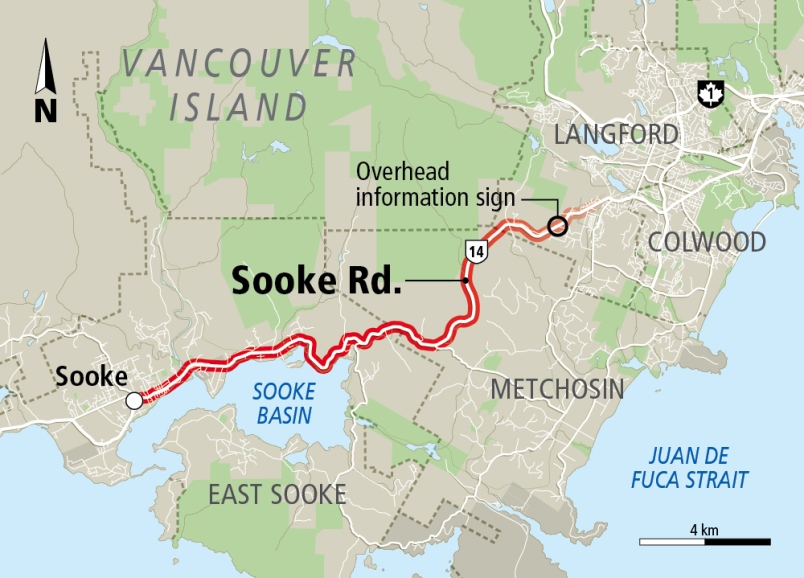
Langford is robust, business-first, big on sports and enjoys the rough and tumble, the big bold statement. Sooke — only about 20 km to the west along Highway 14 — is ‘of the earth’… still stubbornly weaving it rural, forestry and fishing roots into its ‘way of knowing and being’. Langford is the gleaming city on the hill that vibrates and impresses with expansion and bold initiatives, while Sooke is the low-lying meadow, the fields of green where peace somehow finds a way to make its mark on people who live there and visit.
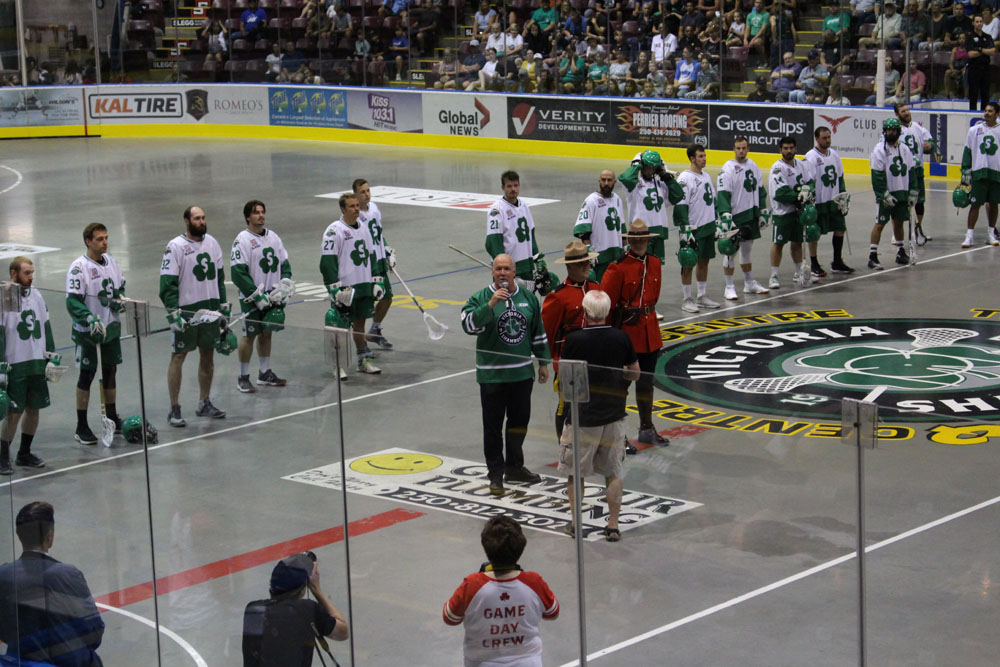
Horgan has over the years often intimated that Sooke is where he feels most at home. Yet he has lived for over 25 years in Langford in the same house where he and his wife raised their now-grown family. His spiritual inclinations (not often articulated but which inform his philosophy of ‘making life better for everyone’) are at home in Sooke; he did, after all, study at Trinity College for his first post-secondary academic years. His ambition is at home in Langford, where his nature to help all has had no choice but to be pitted against ‘every man for himself’ (but you still gotta be part of the team) within the driving force that is Langford.
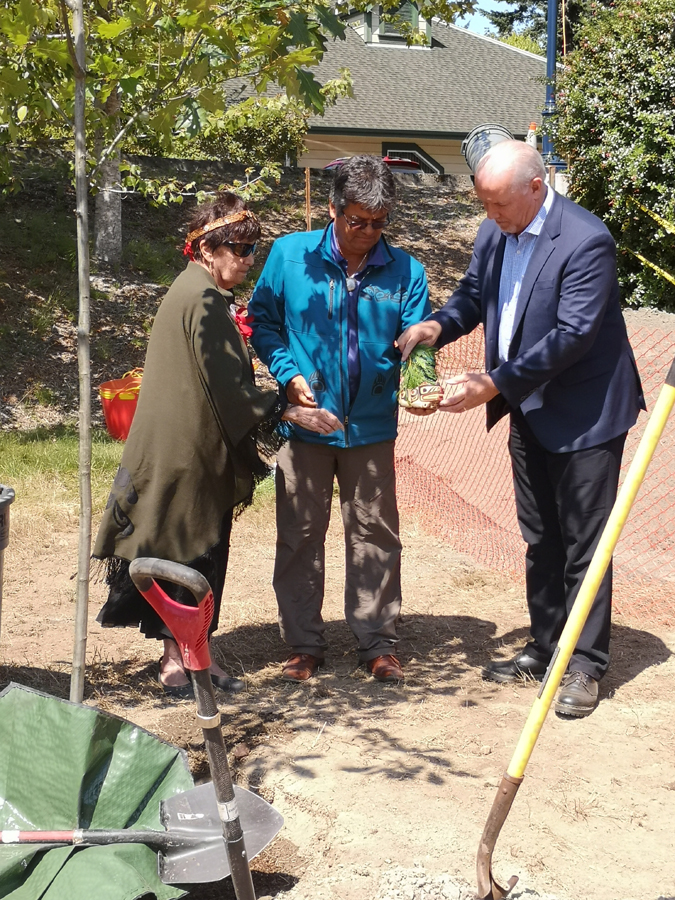
Horgan often talks about his friends and neighbours on his humble street in old Langford, and how that has shaped his understanding of the lives of real or ‘everyday’ people. But he has bonded closely with various Sooke-area community leaders and groups (like the ones who quietly provide a hot meal for people in need on Fridays), like blood-brothers or sisters, in ways that have motivated his spirit to carry on when the going got tough.
Horgan also takes regular counsel from T’Sou-ke Nation elder Shirley Alphonse. He acknowledged her support recently on the campaign trail. His energies have become one with the region in which indigenous peoples prospered for centuries before the organization of western civilization came along.
It will be interesting to hear in the next media call how Horgan has been shaped — and how he has shaped the province and makes decisions going forward — based on the indelible mark that the Langford/Sooke contrasts have imbued in him over the past 25 years (and the past 15 years in politics).
Horgan has taken the two tones of the riding and harmonized them into a political philosophy that is both practical and inspired.
Tired but alert to the task:
Otherwise, today a premier-elect — understandably tired after the 32-day snap election campaign covered lightly just a few more things with professional journalists who were probably also a bit groggy after some late-night election results coverage. It would not be inaccurate to say today’s media session was a bit deflating, though probably a reflection of how restrained the presumed winners are (until final count is known).

He lightly mentioned the forestry sector, protecting the natural environment and continuing to build toward solutions with indigenous peoples.
There was a brief moment about schools during the pandemic (nothing new, other than to hear for the first time a complaint that the federal injection of funds was late coming).
And Horgan reiterated about “focussing on the needs of individuals” (which, if you had to pick one thing, was the sentiment that won him last night’s majority by drawing new voters who previously voted by a different stripe or hadn’t vote recently or before).
He mentioned the hard-hit tourism and travel sector (in the context of when the US-Canada border might at whatever point in time be re-opened) and also how his BC NDP government will continue to improve health care services (including building new hospitals).
The long-range strategist that is BC’s now twice-elected NDP premier did drop a bit of a bombshell, saying that the spring 2021 budget “will be one of the most extraordinary budgets ever tabled in BC”.
Again honouring the late Dave Barrett:
It would be an oversight not to mention that Horgan again today — at least the third time during the campaign/election — highlighted with great reverence the foresight of the late BC Premier Dave Barrett (1930-2018; Premier during 1972 to 1975).
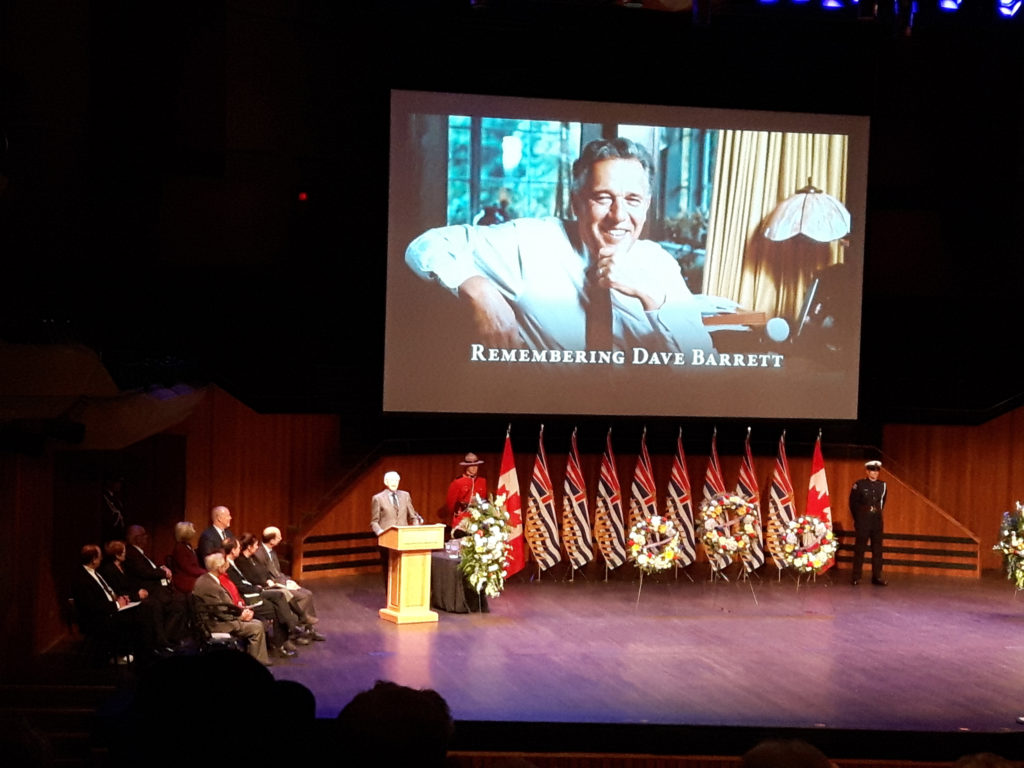
Barrett’s insights and legacy still impact and shape BC to this day, said Horgan. He has referred during the campaign to Barrett’s creation of the Agricultural Land Reserve which placed an emphasis on the need to grow food locally and sustainably. There are also the rarely discussed things like humanizing the education system in the 1970s by banning corporal punishment of students for presumably misbehaving.
The man, the politician:
Again with insight into the man, John Horgan likes communication, collegiality, camaraderie and cooperation. He likes it when people get along. He often calls opponents ‘friend’ or ‘buddy’. That’s a generous if not quirky approach to building alliances — and it’s better than aggression — but doesn’t always succeed in forging a bond with a stable plank beneath it.
Today John Horgan said that the cooperation among the three parties in the Legislative Assembly (BC Liberals being the Opposition and the BC Greens de facto comrades in arms) during March through May of the pandemic year dissolved away: “In June to September that happiness was gone.”
Pining for good times with opponents seems somehow naive in the rough and tumble high-stakes game of politics. But Horgan has the wherewithal to take politics to a higher level — he got a taste of it during the duress of the new pandemic and wanted more. To the benefit of British Columbians, it would appear — given the support he received last night in the election results (advance and voting-day ballot counts combined).
Sharing the pandemic burden:
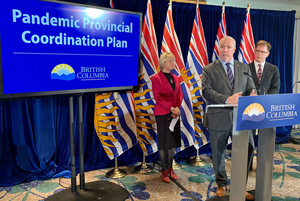
If we can see the delay in election results as yet one more indicator of the power of the COVID-19 virus and its insidious way of impacting all things, then as an entire provincial population we bear one more shared muted burden.
But none of the burdens we collectively suffer in “our pandemic” in BC (to coin Provincial Health Officer Dr Bonnie’s phrase and perspective) come anywhere close to what our parents, grandparents and great-grandparents suffered during WWI and WWII, and cannot even be compared to the misery of the ‘Spanish Flu’ viral epidemic of 1918-1920 at a time when medical interventions were limited. In 2020 we have our homes and various technologies to take comfort in. Heading to the grocery store wearing a face mask is barely an inconvenience.
Not to minimize the serious health impacts for those who do endure illness due to the COVID-19 virus, the overall pandemic is not the tough ride that it could be. Government policy (such as supports for individuals, families and businesses) are largely to been given credit for the softened tone of what could — if anyone is not careful — become a true calamity.
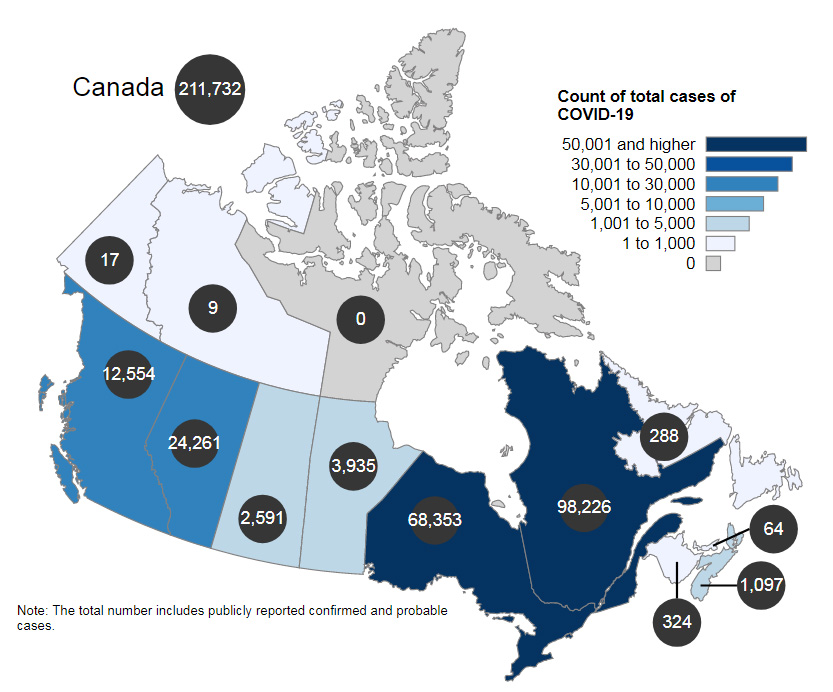
Across Canada, several politicians, a few doctors, and a couple of public health leaders have implied or come right out to say that the coming winter will be tough.
The second wave of COVID-19 infection is already upon us (more self isolation, and ill health, for many), and the economic devolution caused by the pandemic has — in some ways — only yet begun (entire economic sectors are still impacted). For the most part, in British Columbia this is being taken well in stride.
Choosing a long-range leader:
Political stripe aside, Horgan at the helm — achieved with some long-range political mastery (patience is the hallmark of success there) and no fear about striking while the iron was hot (in terms of a snap election) — is where British Columbians overall have their safest bet for getting through this pandemic relatively intact.
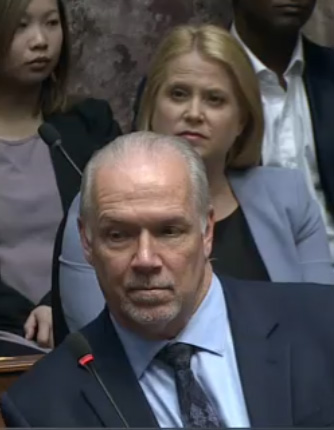
Horgan is also not afraid in any way to be perfunctory. He will do what it takes to win, but somehow without the shenanigans and hard edge that his major competition seems to bring to the political game. Case in point, he has said a few times in the last couple of weeks: “I don’t care where ideas come from. If they’re good ideas, I will use them.” Though for those of us in the business of ideas, that can seem a bit cutthroat unless the spoils are somehow shared. Many a person has contributed from the heart to a political cause, some not always sensing full appreciation for their commitment.
Horgan is a happy go lucky guy — appreciative of his strengths and opportunities. He seems happy when around the innocence of children, which is a notable mark of honesty.
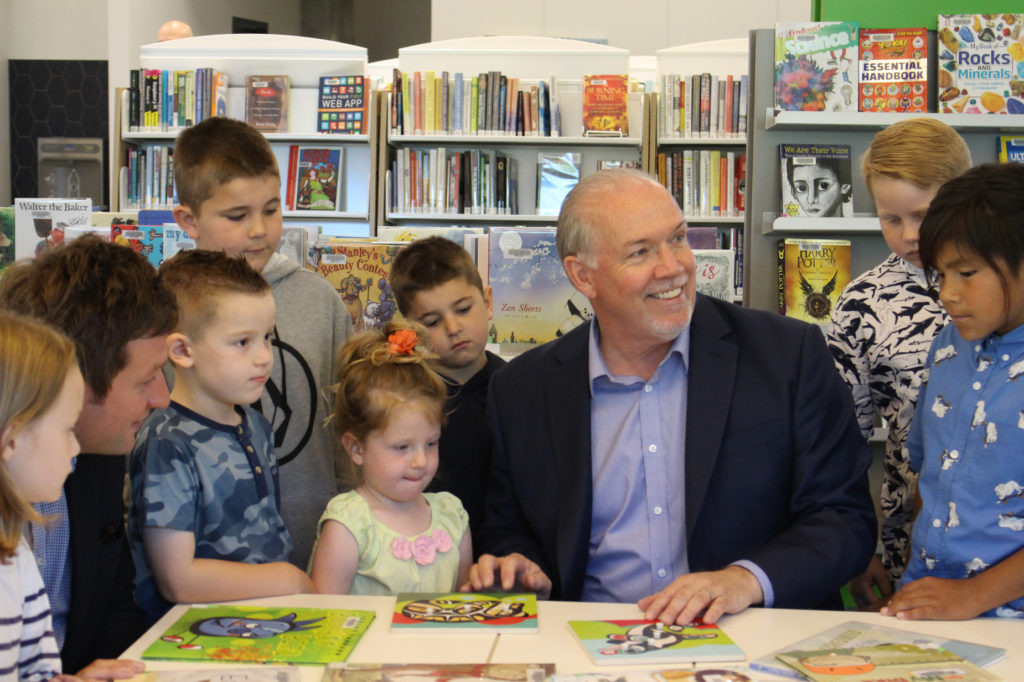
As for the majority win: “That’s what I set out to do, and I’m glad we were successful,” said Horgan today.
Horgan’s re-elected NDP government is a first-time thing in BC. All previous BC-NDP premiers never succeeded in achieving a second term for themselves or their party.
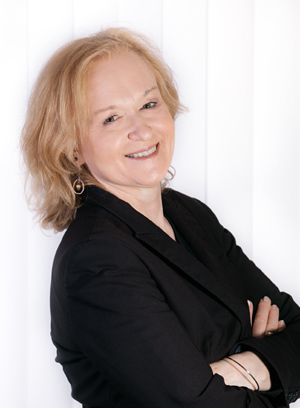
===== About the writer and the timing: Mary P Brooke, editor and publisher of Island Social Trends, has since 2007 lived and worked in both Sooke and Langford within the Premier’s riding. She has seen up close the steady steps — sometimes with sidesteps — that John Horgan has taken to woo the voters of the region. Sure, it’s on the record that in 2013 he said he wasn’t interested in being leader (enduring the grinding losses to himself and the Sooke area in particular under the BC Liberals was hard), but then in 2014 he was. And now he can rightfully boast of his success in having the opportunity to lead BC quite solidly in a new more prosperous-for-all direction in this very treacherous yet exciting time in modern history.



